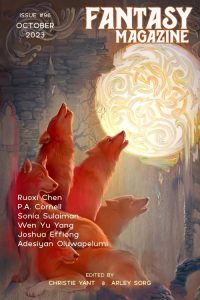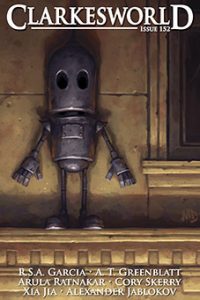Charles Payseur Reviews Short Fiction: Fantasy, Flash Fiction Online, GigaNotoSaurus, and Baffling
 Fantasy 10/23
Fantasy 10/23
Flash Fiction Online 10/23
GigaNotoSaurus 10/23
Baffling 10/23
Unfortunately, October brought the final issue of Fantasy, which closed in impressive fashion. First, in fiction, Ruoxi Chen’s “Fandom for Witches“, finds Lara, a Chinese-American girl lightly obsessed with the (definitely not Supernatural) fictional television show Sanctuary Road. The story deals with yearning, with fitting in, with all the messy bits of growing up and feeling alone and powerless, dealing with a parent being ill, with isolation at school and at home. For Lara and her friend Shen Jia, the show captures something for them despite being, well…not that good. But through their fan fiction and through their love of the show, they create magic – one that they can contribute to and participate in, however doomed it might seem. And they can break through their isolation and find a space, a voice, and a power in the world. In the poetry of the issue, Joshua Effiong’s “The Equation of Time” is framed as a question and answer, though whether the supplied answers are “correct” or merely one possible answer is left for readers to determine. The exchange is about time and its passage, the sense of family and generations and navigating moving back and forward in time informed by personal histories and perspectives. The piece doesn’t seem to view the history as limitless, but rather a link in a chain stretching on in both directions, bound by what has come before but still able to be influenced and changed. It’s a fascinating read.
The latest from Flash Fiction Online includes the somewhat surprising “To Slay a Goblin” by Dylan Curry, which manages to comment on and complicate fantasy tropes through a singular encounter between a would-be hero and a goblin bothering a small town. The Adventurer works from the standard script most often found in fantasy video games and media in general – a town has a problem with a goblin, and the Adventurer can gain some money and experience by taking care of it. But when the two meet in the goblin’s cave, it’s not what the Adventurer expected, and the battle, quick and brutal, reveals the decidedly not-glorious reality of conflict, violence, and prejudice. Curry makes every word count in challenging the fantasy tropes that the Adventurer has internalized and leaving readers to sit with the chilling aftermath of what happens.
GigaNotoSaurus leans a bit into the spookiness of the season but with a focus on academia and history, as I’ve come to deeply appreciate from E. Saxey, with their “On the English Approach to the Study of History” which unfolds at a small conference at Cambridge celebrating the university’s central position in historical research because of its roots and ties to the still-living historical-figures-in-residence, Elizabeth I and some of her court. And while much of historical academia focuses on conversations with the rather creepy preserved and animated former queen, younger researchers like Ali view the reliance on their firsthand accounts of history as limiting the field. Saxey balances keen criticisms of historical academia with the recognition that the situation is not as simple as it appears, interrogating both the gatekeeping and “progress” of liberal arts institutions while revealing the creeping terror that academics are ill-equipped to prevent from slipping out into the world. It’s a complex and rewarding read.
The October Baffling Magazine opened with A.D. Sui’s tender and wrenching “The Succubus and the Store Clerk“, wherein the narrator watches Margo, a succubus, feed each week in what the two of them consider a kind of ritual – and a kind of date. But Margo invites only men back to her place to feed, something the narrator believes disqualifies her for Margo’s affections. And, dying of cancer, the narrator deals with her own feelings for Margo as best she can, facing the spectacle of eroticism and predation with a mix of yearning and love. It’s a messy story of memory, sensation, and hunger, and Sui does a beautiful job rendering it on the page, inviting readers into an added layer of voyeurism that makes for a tantalizing read. Lindsay King-Miller’s “Changeling” shifts focus to family and identity, featuring a daughter whose mother tells a story of saving her from the forest, from the fairies. And as outlandish as it sounds, something about it resonates, as the daughter must wonder what she was saved from, as her mother strictly controls what she eats, what she does, and who she can interact with. King-Miller does a great job of questioning whether the daughter is truly saved, and finds in the answer a possible freedom, as she finds that the truth inside the story might open up a door she had considered long closed.
Recommended Stories:
“Fandom for Witches”, Ruoxi Chen (Fantasy 10/23)
“The Succubus and the Store Clerk”, A.D. Sui (Baffling 10/23)
Charles Payseur is an avid reader, writer, and reviewer of speculative fiction. His works have appeared in The Best American Science Fiction and Fantasy, Lightspeed Magazine, and Beneath Ceaseless Skies, among others, and many are included in his debut collection, The Burning Day and Other Strange Stories (Lethe Press 2021). He is the series editor of We’re Here: The Best Queer Speculative Fiction (Neon Hemlock Press) and a multiple-time Hugo and Ignyte Award finalist for his work at Quick Sip Reviews. When not drunkenly discussing Goosebumps, X-Men comic books, and his cats on his Patreon (/quicksipreviews) and Twitter (@ClowderofTwo), he can probably found raising a beer with his husband, Matt, in their home in Eau Claire, Wisconsin.
This review and more like it in the December and January 2023 issue of Locus.
 While you are here, please take a moment to support Locus with a one-time or recurring donation. We rely on reader donations to keep the magazine and site going, and would like to keep the site paywall free, but WE NEED YOUR FINANCIAL SUPPORT to continue quality coverage of the science fiction and fantasy field.
While you are here, please take a moment to support Locus with a one-time or recurring donation. We rely on reader donations to keep the magazine and site going, and would like to keep the site paywall free, but WE NEED YOUR FINANCIAL SUPPORT to continue quality coverage of the science fiction and fantasy field.
©Locus Magazine. Copyrighted material may not be republished without permission of LSFF.







